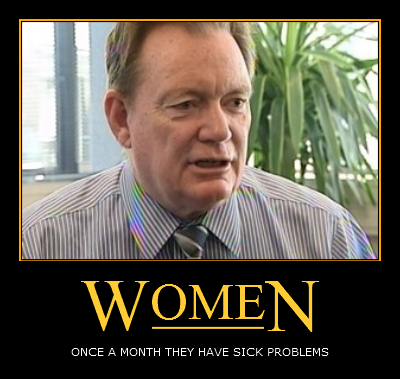
By Mike Kay
The comments made by the head of the Employers and Manufacturers Association that pay discrimination against women was justified because they may take sick days when they have their period has rightly provoked widespread outrage. It seems hard to believe that Alisdair Thompson thought he could get away with spouting such crap. But the fact is that he has the arrogance born of someone who has been getting his own way for years. His comments have to be seen against the sustained attack on the working class for a generation. Even under the so-called “worker-friendly” Labour led government of Helen Clark, inequality spiralled and union membership stagnated.
Over its term of office, the National/ ACT/ Māori Party coalition government has instigated a number of anti-worker laws. The 90 day “sack at will” law was initially brought in for the benefit of businesses employing 20 or fewer staff. That law has now been extended to be available to all employers. Other negative changes for workers include the right of an employer to demand a sick note after a single day’s absence without reason, restrictions on union access to the workplace and the removal of reinstatement as the primary remedy for unfair dismissal. Tau Henare’s privatemember’s bill on Secret Ballots for Strikes is currently before select committee. All these assaults have gone hand in hand with attacks on beneficiary rights, thus squeezing the working class at both ends – both in and out of work.
National’s plans to further restrict workers’ rights are currently being kept under wraps, although John Key warned that unions won’t like the changes. Key has also refused to rule out ACT’s “back to the future” policy of reintroducing Youth Rates for the minimum wage. Youth Rates were all but abolished in New Zealand following a campaign spearheaded by Unite Union that involved militant actions including strikes against pay discrimination.
Other unions failed to fight as hard as Unite, and that situation barely changed with the Tories coming to power. Some union leaders may have talked a good fight about standing up to the government, but apart from a couple of tokenistic rallies, there has been very little action. For the most part, union leaders have no answers to the current attacks other than to implore workers to vote Labour.
It’s not surprising that Key and his cronies have been so confident about continuing to ratchet up the exploitation of the working class another notch every few months. The only potential spanner in the works is the formation of Mana. If Mana manages to mobilise a movement of low paid workers and beneficiaries, the government may finally face some serious opposition.

We have seen a few isolated, elementary protest actions recently. For instance, on Budget Day, the Rotorua People’s Union staged a rooftop protest at the offices of the local National Party MP, Tom McClay. What’s currently lacking is a co-ordinating centre for such dissent. Workers Party members will be participating in upcoming hui organised by Mana to help shape a programme that workers and oppressed people need to confront the latest capitalist crisis.

Just another WordPress site